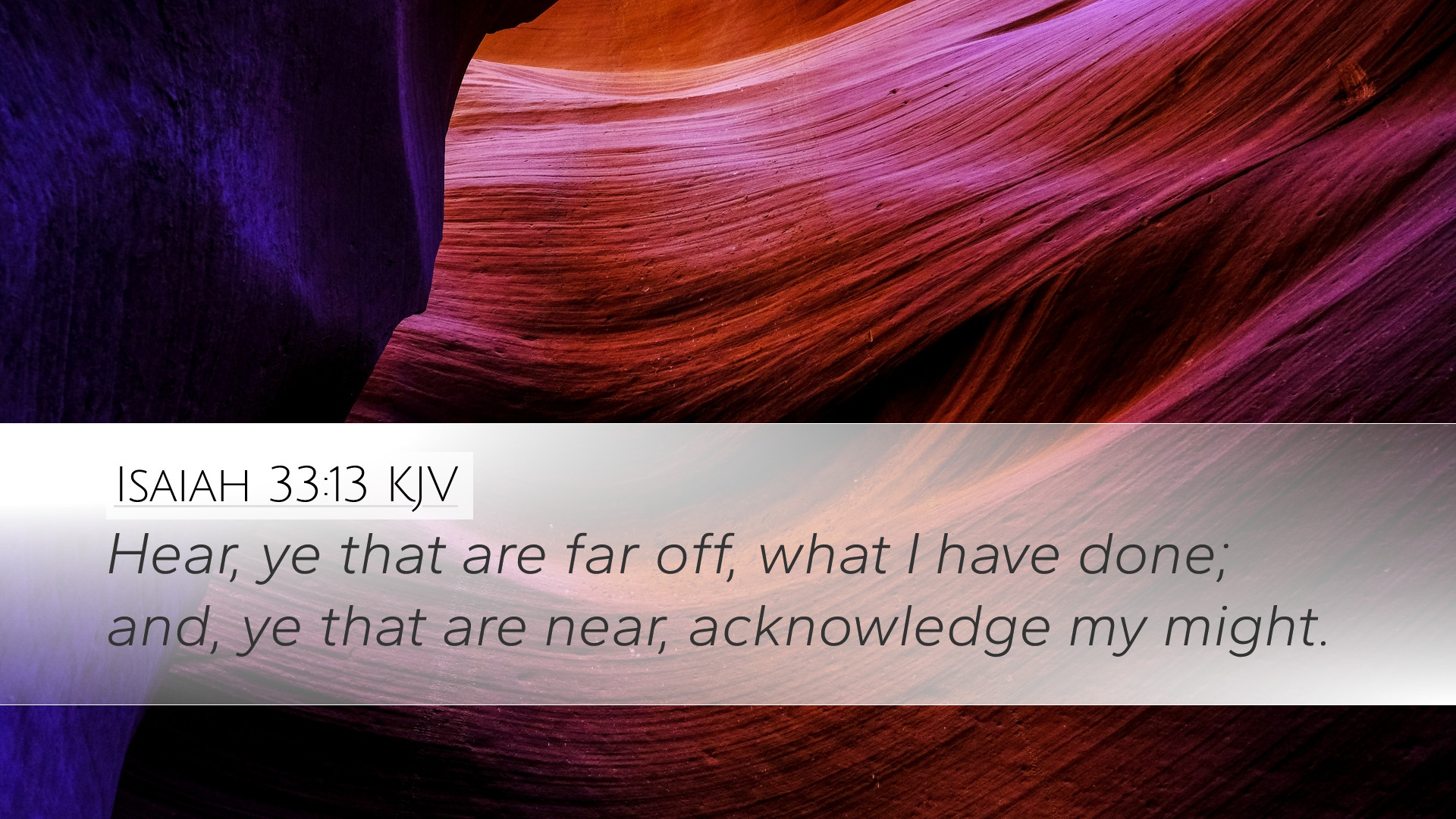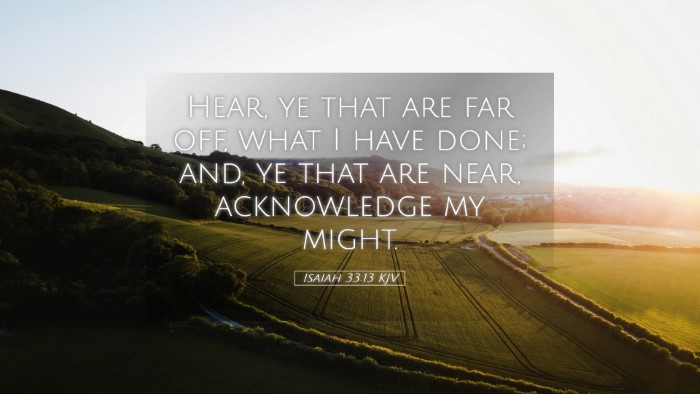Commentary on Isaiah 33:13
This verse, taken from the book of Isaiah, carries profound implications about the nature of God and His interaction with humanity, particularly in the context of judgment and the responses of different people. The overall message of Isaiah is one of warning and hope—a duality that reflects the character of God as both a righteous judge and a merciful savior.
Text of Isaiah 33:13
"Hear, you who are far off, what I have done; and, you who are near, acknowledge My might."
Contextual Analysis
In the preceding chapters, Isaiah addresses the calamities faced by Judah due to their disobedience and the impending judgment through foreign nations. This chapter stands as a pivotal moment, calling attention to how God’s works of judgment and deliverance are perceived by different groups—both those who are distant from God's covenant and those who are nearer.
Audience: Those 'Far Off' and 'Near'
The phrase "you who are far off" can refer to the Gentiles or those who are outside of the covenant community, while "you who are near" refers to the Israelites, God's chosen people. This dynamic illustrates a universal message of God's sovereignty and His ability to evoke recognition of His power from all people, regardless of their relationship to Him.
- Importance of God’s Works:
According to Matthew Henry, the emphasis on hearing and acknowledging speaks to the importance of understanding God's actions in history. It serves as a reminder that God's might is not distant nor detached but is actively involved in the affairs of nations.
- Call for Recognition:
Albert Barnes emphasizes that this call for acknowledgment serves as an invitation for repentance and recognition of God's lordship. He notes that it is crucial for both nations and individuals to recognize God's hand in their circumstances, prompting a necessary reflection on their spiritual state.
- The Nature of God’s Might:
Adam Clarke elaborates further by asserting that the might of God is not merely demonstrated through acts of power, but also through His righteousness and the fulfillment of His promises. The acknowledgment of His might leads to a deeper reverence and a recognition of His sovereignty over all creation.
Theological Significance
This verse raises significant theological themes pertinent to the study of divine revelation and human responsibility. The actions of God serve as a basis for recognition of His sovereignty across all nations, inviting discussions on the nature of divine justice and mercy.
Judgment and Hope
Judgment: The immediate context of this verse centers on God’s judgment against those who oppose Him. As expounded by Henry, the proclamation serves as a warning; while some may bask in disobedience, the day will come when they will hear and feel the weight of God's power against their rebellion.
Hope: Conversely, this acknowledgment also offers hope. For those who turn toward Him in repentance, as noted by Barnes, there is the promise of mercy. God's might is not only a force for judgment but also a means of salvation. The appeal to recognize His works is fundamentally an appeal to return to Him, echoing the message of hope found throughout the prophetic literature.
Practical Application
The implications for contemporary faith communities are manifold:
- Call to Awareness:
Pastors and church leaders should encourage congregations to be aware of God's work in both personal and communal contexts. Recognition of God's past actions encourages faith in His future provisions.
- Invitation for Repentance:
This verse serves as a powerful tool for preaching repentance, reminding both believers and non-believers of the necessity of acknowledging God's sovereignty and responding to His call for a relationship.
- Understanding God’s Nature:
The affirmations of God’s might are significant for theological teaching. In a world that often questions divine intervention, emphasizing God's active presence and sovereignty reassures believers of their hope and faith.
Conclusion
Isaiah 33:13 is a poignant reminder of the universality of God's call to acknowledge His might. As both an exhortation and a warning, it encapsulates the essence of Isaiah's prophetic ministry. Through the insights of Henry, Barnes, and Clarke, we see a multifaceted view of God's character that is relevant to all—pastors, students, theologians, and scholars alike. Recognizing God’s works is not merely an intellectual exercise but a deeply spiritual call to engage with the living God who desires relationship and recognition from all people.


